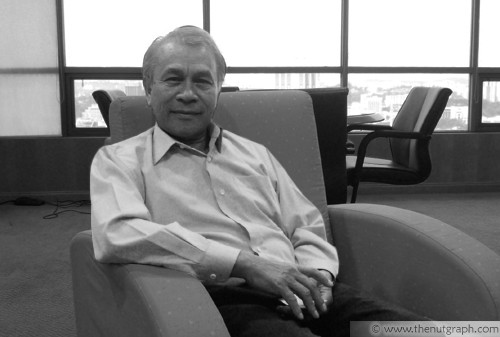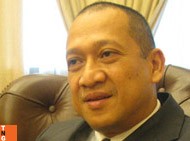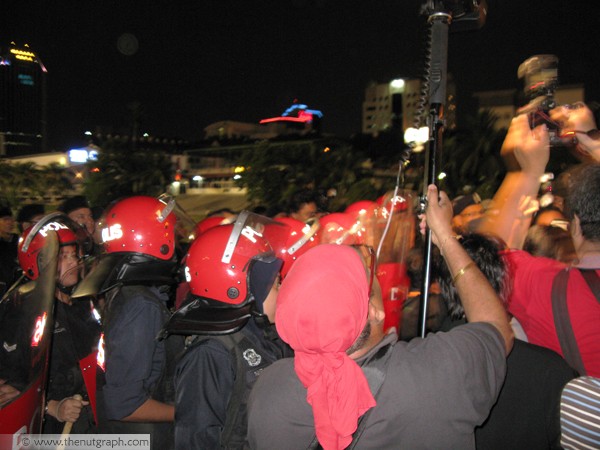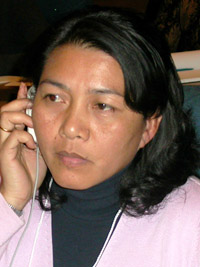TAN Sri Hasmy Agam was appointed the new Suhakam chief in June 2010. Previously, he was executive chairperson of the Institute of Diplomacy and Foreign Relations (IDFR), and secretary-general of the United Nations Association of Malaysia.

“I’m conscious of the fact that I’m no longer a civil servant. Now that I’m the chair[person] of Suhakam, I’ve to be neutral and independent,” says Hasmy during an interview on 11 Aug 2010 at his office in Kuala Lumpur.
The former diplomat acknowledges that he may have to make statements unfriendly to the government from time to time, as his job now is to highlight human rights violations. He also notes that the other six appointed commissioners all come from non-governmental organisation (NGO) backgrounds.
In this interview with The Nut Graph, Hasmy Agam talks about his plans for Suhakam in the next three years, what steps he will take to overcome its limitations, and on human rights issues in Malaysia.
TNG: As the new Suhakam chief, what do you hope to achieve with Suhakam during your term?
Hasmy Agam: We’ll continue to work on creating awareness about human rights among the public. Suhakam has generated greater awareness about human rights over the years. However, many Malaysians still don’t assert these rights.
We also plan to intensify our efforts in sensitising government agencies on human rights issues. They are [supposed to] protect human rights. But sometimes they may become overzealous, especially enforcement agencies like the police and immigration department.
They need to understand that they have to do their job with a sense of proportion, at both the subordinate and management level. Unless the people on top understand [that they need to ensure that human rights are not violated when carrying out their job], they will not be able to guide their subordinates. They say “tangkap”, their subordinates would just follow the order, like in the recent anti-ISA (Internal Security Act) candlelight vigil. Even [people they consider as] lawbreakers have rights, like the right to legal representation, and the enforcers need to respect that.
Another challenge is to follow up with the recommendations that Suhakam has made to the government in the past. We’ve had so many public inquiries and made several recommendations including to repeal the ISA, but many have yet to be implemented.

It’s also quite awkward that for 10 years [since Suhakam was established], none of its reports have been discussed in Parliament. I’ve started talking to Datuk Seri Nazri (Aziz), the minister in charge of parliamentary affairs. He has accepted in principle that there should be a session, one day or half a day, allocated to discuss Suhakam’s [annual] report.
There’s also a need to restructure Suhakam. There is currently quick turnover of staff because of the lack of upward mobility. Most of our staff are hired on contract. They’re quite passionate about human rights issues, but if there’s no upward mobility, there’s a limit to how long they would stay.
As you know, our term only [lasts for] three years. There are a lot of expectations [from different parties]. We will try to engage with [our stakeholders, including] parliamentarians, enforcement agencies, media, civil societies [etc].
But the challenges are great. Human rights cover a wide range of issues, starting from birth to death, [so] it’s difficult to cover all, especially since there are only the seven of us. We’re appointed on a part-time basis, but I’ve given up my other job [to focus on this]. I was previously the IDFR executive chair[person]. Other commissioners, except for those from Sabah and Sarawak, try to come here as often as possible, too.
What are some of the steps Suhakam is taking, or plans to take, to overcome its limitations?
We’re an advisory body; we don’t have enforcement powers. Past commissioners have expressed the need for Suhakam to be given more teeth. Unfortunately, that was not addressed [by the government].
But even within the limitations we’re facing, we can choose to be reactive or proactive. Reactive means we only look into an issue when someone lodges a complaint. In fact, we receive many complaints in a year.
However, we feel that we can also be proactive in some cases. Like in the recent candlelight vigil, we decided to monitor it. We received the organisers’ notification that they were holding the vigil about a week before it was held. As human rights defenders, we believe peaceful assembly is a human right we need to protect, so we felt in was incumbent upon Suhakam to monitor [the vigil].
When we told the police we wanted to monitor, though, the first reaction wasn’t good. They thought we wanted to join the protesters.
Why did the police think so?
I think many [among the police] don’t understand Suhakam’s basic function. They probably thought that since it was an illegal assembly, we had no right to observe it.

There’s also this perception by some [government agencies] that Suhakam is an NGO. We’re not. [Ironically], civil societies consider us part of the government. We’re not. We’re an independent entity.
In the end, we managed to convince the police that it’s their job to [take care of] security, but it’s also our job to monitor [the vigil], and the protesters will do their job to make a point. Each of us has our own role to play.
Since [the police considered it] an illegal protest, they’re duty-bound to arrest the protesters under the Police Act, but they didn’t have to use force. When the lawyers wanted to represent the protesters, the police also wanted to record the lawyers’ statement as if they, too, were protesters. That was uncalled for. The lawyers were merely there to represent their clients. We’ve recorded what happened, and I think things [definitely] need to be improved.
What about the case with the migrant workers at the new Istana Negara who claimed that they were not paid their wages? Suhakam also had difficulties getting access to the site?
Unfortunately, we were only allowed to visit the site after two weeks. By the time we got there, we weren’t able to observe much. The employers denied the non-payment and alleged that it was fabricated by others.
Still, I think this case is just the tip of the iceberg. There is a lot of construction going on all over the country. The exploitation of migrant labour is a big issue. Our commissioners are now trying to look at the issue.
What about the Penan rape cases in Sarawak? Why did Sarawak Suhakam commissioner Detta Samen refuse to be the adviser for a proposed task force to investigate the sexual exploitation of Penan girls and women?
We’re concerned about this issue. I think because the commissioners are new, some of them may be more careful with what they say [and agree to do]. But we’re definitely concerned about issues concerning indigenous people. In fact, we’re thinking of setting up a national inquiry on indigenous people. We’re weighing between looking into indigenous people, women’s issues, and issues concerning our aging population.
What about the Islamisation of indigenous people? Has Suhakam looked into that?

I was told by Sabah commissioner Jannie Lasimbang that the problem arises during the reporting of the child’s birth. Sometimes the authorities add a “bin” or “binti” to the child’s name, not realising the religious connotation, so these children are later assumed to be Muslims.
What about the Islamisation of Orang Asli in Peninsular Malaysia? Both The Nut Graph and Al-Jazeera have reported on the issue this year. Did anyone lodge a report with Suhakam about these cases?
No. Otherwise we would have investigated.
Is Suhakam going to look into sexuality rights issues, especially concerning LGBT (lesbian, gay, bisexual, and transgender)s? These communities are often marginalised. They are denied employment opportunities, and are harassed by authorities and the media because of their sexual or gender identity.
This is a sensitive issue. We need to look at it with understanding. In fact, at the Asia Pacific Forum in Bali, I was the first to take the floor to discuss this issue. I [told the delegates] I had a personal dilemma dealing with these issues. We need to protect human rights, but at the same time, we live in a society that is not ready to embrace these communities.
Suhakam is not dismissing it, but we will need to look into the issues within our cultural and religious context. During our first press conference, some people also submitted a memorandum [highlighting the media’s problematic representation of these communities].
We definitely need to treat these communities with respect and dignity. As a nation, we have to demonstrate more empathy. But [I’ve to admit] this issue is big and not something that is likely to be resolved within our term.
Does Suhakam plan to engage the government to convince it to ratify major international conventions, for example, the International Covenant on Civil and Political Rights and the CAT (Convention against Torture and Other Cruel, Inhuman or Degrading Treatment or Punishment)?
When I was in the Foreign Ministry, I pushed for the government to come on board these international conventions. We’ve been talking about it for so many years but we’ve yet to ratify them.
The standard government position was that we could not ratify these conventions unless we could fully comply and implement its provisions [on the ground]. But Malaysia has ratified Cedaw (Convention on the Elimination of All Forms of Discrimination against Women) and the CRC (Convention on the Rights of the Child).
Personally, I’ve always felt it’s embarrassing that Malaysia has yet to ratify these conventions, especially the convention against torture. We cannot condone torture. It’s a long-haul fight. We will continue to engage with the government. I’ll be happy if the government is willing to come on board. ![]()
The Nut Graph needs your support


azmo says
[A] human rights organization that has no teeth. Just created to keep the UN happy that we have a charter, that’s all.
The chief can announce all day that Suhakam is independent, but people who understand what is human rights, believe that this body is merely filled with paper pushers that are merely yes-men, just like everyone in the civil service. There may be a few people that genuinely believe in the work, but the heads are talking heads.